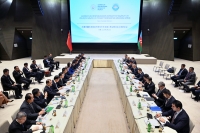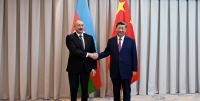China’s National Bureau of Statistics released the "Half Year Report" on its economy for 2024. In the first half of 2024, China's gross domestic product (GDP) was 61.7 trillion yuan, a year-on-year increase of 5.0%. The overall operation was stable and steady, with new driving forces accelerating growth and new progress made in high-quality development.
A representative of China's National Bureau of Statistics said: “Observing from a global perspective, China's economic performance is still good. In the first quarter, the GDP growth rate was faster than that of the United States, the eurozone, Japan, and other countries. Combined with the domestic and international situation in the second quarter, it is expected that China's economic growth rate will continue to lead in the first half of the year and remain an important engine and stabilizing force for world economic growth”.
Recently, international institutions such as the International Monetary Fund, World Bank, Morgan Stanley, Goldman Sachs, and UBS have raised their expectations for China's economic growth this year, casting a vote of confidence in the country's economic prospects. On July 16, the International Monetary Fund published an updated version of the World Economic Outlook report, putting China's economic growth rate at 5% for 2024, which is 0.4 percentage points more than the forecast published in April this year. Pierre-Olivier Gourinchas, Chief Economist of the International Monetary Fund, said that China and other emerging Asian economies still remain the main engine for the global economy, Caspian Energy Media reports with reference to www.gov.cn.
"China's economic growth has shown good results among the largest economies." Yu Hong, a senior research fellow at the East Asian Institute Studies of the National University of Singapore, said that in the first half of the year, China's economy grew 5.0% year-on-year, and total imports and exports of goods increased by 6.1% year-on-year. "This reflects the sustainability of China's foreign trade and China's important role in the global industrial chain."
"There are many factors of instability and uncertainty in the world today, and China very rarely achieves 5.0% economic growth." Michael Borschmann (Chinese name: Bo Xiwen), former director of the Department of European and International Affairs in Hesse believes that "the fundamentals of China's economy are stable and will continue to support sustainable growth in the future.
Jens Eskelund, President of the European Union Chamber of Commerce and Industry in China, said “in the first half of this year, imports and exports of Chinese goods increased significantly, especially the total value of exports, which reached an increase of 6.9%”. He said that China pays special attention to the development of high-tech industries and is looking for new growth drivers with more technological content and higher added value.
In the first half of the year, investment in high-tech industries increased by 10.6% year-on-year, which was 6.7 percentage points faster than total investment; The added value of high-tech manufacturing industries above a certain scale increased by 8.7% year-on-year; The proportion of non fossil energy consumption to total energy consumption increased by 1.9 percentage points year-on-year; The online retail sales of physical goods increased by 8.8% year-on-year.
In the first half of the year, China's high-tech manufacturing industry manifested outstanding results, especially cars powered by new energy sources. The growth in the manufacturing of new products is expressed in double digits, which plays an important role in promoting China's economic growth. "This shows that the support policy introduced by the Chinese government for the development of new industries and the development of new productive forces has proved effective and at the same time demonstrates China's strength in the global manufacturing industry. Technological production will greatly benefit the Chinese economy, laying a good foundation for future development."
For the first time, a negative list management system has been established nationwide for cross-border service trade, pilot work has been carried out to expand the opening up of value-added telecommunications services to the outside world, and several policy measures have been introduced to further support foreign institutions' investment in domestic technology-based enterprises... A series of policy measures have been successively introduced, demonstrating China's firm determination to promote reform and development through opening up.
China's cooperation with Latin American countries is growing, the Brazilian organization of business leaders in China, represented by Ricardo Luce, said: The world benefits from China's new development concept of “innovation, coordination, greening, openness, and sharing”.
China is Mexico's second largest trading partner at the global level, and the largest in Asia-Pacific. China's economic growth is vital for Mexico," said a representative of Mexican companies exporting abroad, we actively promote business exchanges between Mexico and China. The second China International Supply Chain Expo will be hosted in Beijing this November. “The exhibition focuses on a number of industries related to new productivity, and the Mexican business community is showing great interest in participation in the exhibition."
Secretary of State of the Hungarian Ministry of Foreign Affairs Levente Magyar said “in recent years Hungary's "Opening to the East" strategy has become more closely linked to the joint implementation of the Belt and Road initiative. Hungary and China have extensive and in-depth exchanges, as well as cooperation in the fields of economics, trade, investment and finance, Hungary can benefit from China's economic development.
Russia is also pinning its hopes on China. "Russia hopes that China will increase investments in the materials sector of its economy," Igor Sechin, CEO of Rosneft, said on July 23, Tuesday during the VI Russian-Chinese energy business forum.
According to him, Russia's oil, gas and coal industries are characterized by "high investment returns" and "no risk of return on equity capital", and direct investments in these sectors from China would strengthen energy security.
Last year, 55 million tons of Russian oil, 40 billion cubic meters of Russian gas, as well as more than 100 million tons of coal were exported and pumped to China from the Russian Federation, Sechin listed. As a result, Russia, according to him, provided almost 20% of China's energy imports, whose needs will only grow. "In particular, according to IEA estimates, liquid hydrocarbon consumption in China will grow 9% by 2030. Russian companies are ready to make their contribution to ensuring energy security and energy consumption in China," he said.
China has turned from an importer into an exporter of capital over the past few years. China's declared direct investments in new projects abroad last year rose to a new high of more than $160 billion.
Last year, the Russian-Chinese trade turnover has reached a new milestone, hitting $240 billion and growing 26.3%. Russia's exports to China are predominantly composed of raw materials. Fuel products, including oil, gas and coal, account for three quarters of all exports from the Russian Federation, according to calculations by the Gaidar Institute
Russia imports mainly machine equipment (40%) and vehicles (15%) from China, while the share of Chinese goods in Russian imports is reaching half (43% as of February 2024).
China is the world’s only country possessing all the industrial categories in the United Nations industrial classification. China has become the world's leading manufacturing power since 2010 and retains this position to this day. According to the Organization for Economic Cooperation and Development, China accounts for 35% of global manufacturing output and 30% of value added in 2023. China's large-scale manufacturing economy and closely linked industrial chains have prompted the global manufacturing industry to continue to reduce costs and improve efficiency.
Author:
Natalya Susel, First Deputy Chairman and Editor-in-Chief of Caspian Energy International Media Group.









